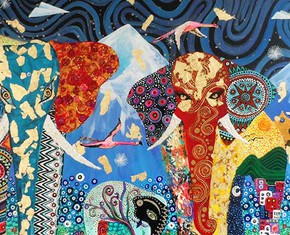The views expressed in our content reflect individual perspectives and do not represent the authoritative views of the Baha'i Faith.
At 17, I distinctly remember hearing a song on the radio and instantly falling in love—with the song itself.
For whatever reason, I believed in that moment that I’d experienced real, true love. I’d never heard this song or the artist before, but I remember staying put, missing my bus to school, and waiting through two more songs until the DJ came back on the radio to announce the name of this new up and coming artist and his newly released album.
I was beside myself. What do I do now? Who is this angel and how do I get more of THAT into my life?
That song touched my soul. It was the combination of the melody, the timbre and sincerity in his voice, and the sheer simplicity of his approach—just a raspy, falsetto male voice and his guitar. I could feel his pain, deep, deep down in the core of my being. The song was cathartic, a release from the old, and an entry into the new. I felt worry and uncertainty, but also a therapeutic silver lining, as this musician attempted to let go of his anxiety and now go in search of greener pastures. He carried me on his journey.
This heightened awareness and feeling of my heart being overtaken by lyric and melody has carried me to new states of consciousness several times since. The songs I would hear evoked feelings of both great elation and bitter sorrow. Abdu’l-Baha, the eldest son of Baha’u’llah, and a central figure of the Baha’i Faith, actually spoke about this kind of moving musical experience, in a far more articulate manner than I can:
Although sounds are but vibrations in the air which affect the ear’s auditory nerve, and these vibrations are but chance phenomena carried along through the air, even so, see how they move the heart. A wondrous melody is wings for the spirit, and maketh the soul to tremble for joy. – Abdu’l-Baha, Selections from the Writings of Abdu’l-Baha, p. 146.
How mysterious, that these musical vibrations are but a “chance phenomena” yet when heard, act like “wings for the spirit” and make “the soul to tremble for joy.” Amazing moments like this in the material world, such as listening to music, can have a profound influence beyond our physical matter, affecting our inner being, our soul. Once again, Abdu’l-Baha articulates this so perfectly when he shares:
A fine voice when joined to beautiful music causes a great effect, for both are desirable and pleasing. All these have in themselves an organization, and are constructed on natural law. Therefore they correspond to the order of existence like something which would fit into a mold. A true voice fits into the mold of nature. When it is so this affects the nerves, and they affect the heart and spirit. In the world of existence physical things have a connection with spiritual realities. One of these things is the voice, which connects itself with the spirit; and the spirit can be uplifted by this means—for though it is a physical thing, it is one of the material, natural organizations—therefore, it is effective. – Abdu’l-Baha, quoted by Mary L. Lucas in “A Brief Account of My Visit to Acca,” pp. 11-14.
Reflecting on my own journey as a young Baha’i and a budding musician, I felt the profound affect of music on my own spirit from a very young age. Although the genre and style of music I played and sang evolved over time, I was always drawn to music like a magnet, and knew that strong melodies had a power over me that words could not articulate.
I was always compelled, from probably the age of two, to sing prayers rather than read them. It’s as though I saw and felt something different, more profound and impactful when I sang those spiritual words. They were easier to memorize and understand when put to the language of music. I assumed everyone felt this way, and as I’ve grown up, travelled the world, and met people from all walks of life, I know now, more than I ever have, that little Shadi was and is not alone.
I’d been singing for as long as I could remember, but when I began to set my own melodies and compositions to the Baha’i writings everything started to shift. The songs I composed suddenly had more meaning to me, and that feeling of love I experienced on the radio when I was 17 was heightened tenfold. I felt as though my voice became my unique and creative channel to share the words of my Creator. I felt free of the judgment I usually felt in songwriting, because these songs were no longer mine, they were God’s. I felt freedom to interpret, understand and apply the writings and words of our Creator and share them.
But I did all this in a deeply personal way, through my music. Not long after I began to set the Baha’i writings to music, I was approached by an amazing human and mentor, Louie Shelton, who offered to record and produce my first studio album at the age of 19. Not many others were recording sacred writings to contemporary melodies at that time, and in all honesty I was pretty shy about it, especially to my classmates. What I was exploring was largely considered as “secular music” and for lack of a better word, was not the coolest thing to be playing at the age of 19. But I felt I had something unique to offer, and I wanted to share this personal, newfound experience with others, so they too could feel connected to the soul-stirring words of the Bab and Baha’u’llah through the same channels.
So I began to study this connection and what my Faith had to say about it. I soon began to rely on the teachings of Abdu’l-Baha about the human heart, and the spiritual effects of the Holy Words of God when paired with music:
The musician’s art is among those arts worthy of the highest praise, and it moveth the hearts of all who grieve. Wherefore … play and sing out the holy words of God with wondrous tones in the gatherings of the friends, that the listener may be freed from chains of care and sorrow, and his soul may leap for joy and humble itself in prayer to the realm of Glory. – Abdu’l-Baha, from a letter to the American Baha’i musician Louise Waite, Selections from the Writings of Abdu’l-Baha, p. 112.
One decade and four studio albums later, I’ve overcome the insecurity I felt as I recorded my first album. I’ve been able to build a career both as a secular and non secular artist, and I’ve also grown to understand and appreciate the material and spiritual implications of both, while deepening my knowledge of the special potency that pairing the writings with music has on my soul—and on the souls of those who I have the privilege of sharing it with.
I reflect back now to that moment at 17 when I heard that song on the radio for the first time, and I am so grateful for this journey of discovery that it led me to, as I can now recognize and appreciate on a deeper level the profound effect of music on my identity as a human being and as a spiritual being.
I’ll close with the words of Baha’u’llah, the founder of the Baha’i Faith, speaking about our joy being born in the name of our Creator, and using music as a ladder for our souls to gain nearness to the Creator:
Let your joy be the joy born of My Most Great Name, a Name that bringeth rapture to the heart, and filleth with ecstasy the minds of all who have drawn nigh unto God. We, verily, have made music as a ladder for your souls, a means whereby they may be lifted up unto the realm on high … – Baha’u’llah, The Most Holy Book, p. 38.
If you have any questions or thoughts, or have a personal experience where you felt your soul was deeply moved or transcended by a lyric or a melody, please share in the comment section below and I’ll do my best to respond.
















Comments
Sign in or create an account
Continue with Googleor